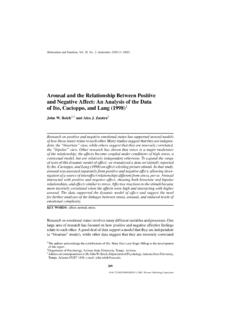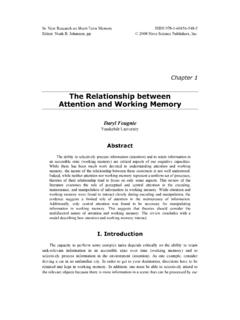Transcription of The Moderating Role of Positive and Negative Affect on the ...
1 ISSN 1303-0485 eISSN 2148-7561 DOI 2015 EDAM Sciences: Theory & Practice 2015 June 15(3) 565-573 Received | 13 May 2014 Accepted | 5 March 2015 OnlineFirst | 7 April 2015a Correspondence Assoc. Prof. As m ivitci (PhD), Department of Counseling and Guidance, Faculty of Education, Pamukkale University, Denizli, Turkey Research areas: Irrational beliefs in adolescents; Rational emotive education; Life satisfaction; School belonging Email: college years, which are known as a stressful time, students may often face stress personally, socially, academically, economically, and so forth in various areas of life.
2 One of the important sources that students use to cope with stress is social support. Students can cope with stress easier via the support they receive from their friends or family. While social support is seen as a protective mechanism against stress, some psychological factors may have increasing or decreasing effects on this support. Positive and Negative affects, two opposing indicators of individual psychological adjustment, may function differently in this context. In the current study, the moderator roles of Positive and Negative Affect on the relationship between perceived social support and stress in college students was investigated.
3 The sample consisted of 479 undergraduate students from the faculty of education in a public university. Data was collected using the Multidimensional Scale of Perceived Social Support, the Perceived Stress Scale, and the Positive and Negative Affect Scale. In data analysis, hierarchical multiple regression analysis based on the steps of Baron and Kenny s (1986) Moderating model was used. The research findings indicate that Negative Affect has a moderator role in the relationship between perceived social support and stress, whereas Positive Affect does not have a similar function.
4 Accordingly, as Negative Affect increases, the Positive effect of social support on perceived stress decreases. Keywords: Social support Stress Positive Affect Negative Affect College studentsAs m ivitciaPamukkale UniversityThe Moderating Role of Positive and Negative Affect on the relationship between Perceived Social Support and Stress in College StudentsEducational Sciences: Theory & Practice566 Stress, a force that many people face and try to cope with in the normal flow of life, is also an inevitable and natural part of the daily life of university students who face the peculiar difficulties of college life.
5 College years are a time when students are responsible for their own health, school life, economic conditions and management of their own lives (Cress & Lampman, 2007; Darling, McWey, Howard, & Olmstead, 2007). This period is accepted as a time in which various difficulties are faced from academic work to uncertainty of what the future holds, from interpersonal relations to romantic relations, from self-problems to familial issues (Chao, 2012).
6 Research shows that 75% of college students perceive themselves as moderately stressed and 12% as highly stressed (Pierceall & Keim, 2007). Concerns about academic achievement, uncertainty about their future, economic hardship, family related problems, difficulties in relations with the opposite sex, and interpersonal relations may also be sources of stress for students (Brougham, Zail, Mendoza, & Miller, 2009; Chao, 2012; Darling et al.)
7 , 2007; Otrar, Ek i, Dilma , & irin, 2002; Ross, Niebling, & Heckert, 1999). Moreover, students also may face stress related to daily life such as health issues, conflicts with faculty, public speech, conflicts with roommates, increasing study loads, and changes in sleeping and eating habits (Darling et al., 2007; Dusselier, Dunn, Wang, Shelley, & Whalen, 2005; Ross et al., 1999). The stress students may face during university life due to personal, social, academic, economic, and other hardships is a concept related to various adjustment variables.
8 Previous research has shown that stress in college students is related to Negative indicators of mental health such as depression, anxiety, and thoughts of suicide (Dusselier et al., 2005; Eisenbarth, 2012; Jou & Fukada, 2002; Otrar et al., 2002; Pengilly & Dowd, 2000; Wilbum & Smith, 2005) and Positive indicators such as happiness, life satisfaction, self-esteem, optimism, and hardiness (Cress & Lampman, 2007; Eisenbarth, 2012; Extremera, Dur n, & Rey, 2009; Krypel & Henderson-King, 2010; Matheny et al.)
9 , 2002; Pengilly & Dowd, 2000; Schiffrin & Nelson, 2010; Wilbum & Smith, 2005). As can be seen, the stress college students often face and try to cope with due to the challenging experiences of being a young adult is an important variable of mental health in regard to psychological adjustment. Various personal sources for university students such as self-disclosure, trust that they will be able to cope with stress, and time and energy management may be functional sources (Matheny et al.
10 , 2002). One of the important ways for students to cope with stress is social support (Chao, 2012; Laurence, Williams, & Eiland, 2009). Students naturally seek social support from friends and family when facing stress, and with this support it may be easier for them to cope with stress (Chao, 2012). Previous studies have shown that social support is one of the stress coping sources that predicts perceived stress in college students (Matheny et al., 2002) and only support from family, friends, and faculty have a protective factor function against stress (Bland, Melton, Welle, & Bigham, 2012).











